Analysis of the Debate: Should Countries Adopt Corporate Management?
VerifiedAdded on 2023/01/09
|7
|1983
|27
Essay
AI Summary
This essay delves into the ongoing debate concerning whether countries should be managed and operated using principles and practices typically associated with business organizations. The essay presents a balanced evaluation of arguments both in favor of and against this proposition. It explores the fundamental differences in objectives, such as profit maximization versus public welfare, and the varying structures of competition and decision-making between countries and companies. The essay further considers the potential advantages of applying business principles like optimum resource utilization and economic development to the governance of a country. The analysis also considers the role of citizens as stakeholders and evaluates the impact of adopting business-oriented Key Performance Indicators for government performance evaluation. Through a comprehensive assessment, the essay aims to provide a nuanced understanding of the complexities of this debate, offering insights into the potential benefits and drawbacks of managing a country with a business-like approach.
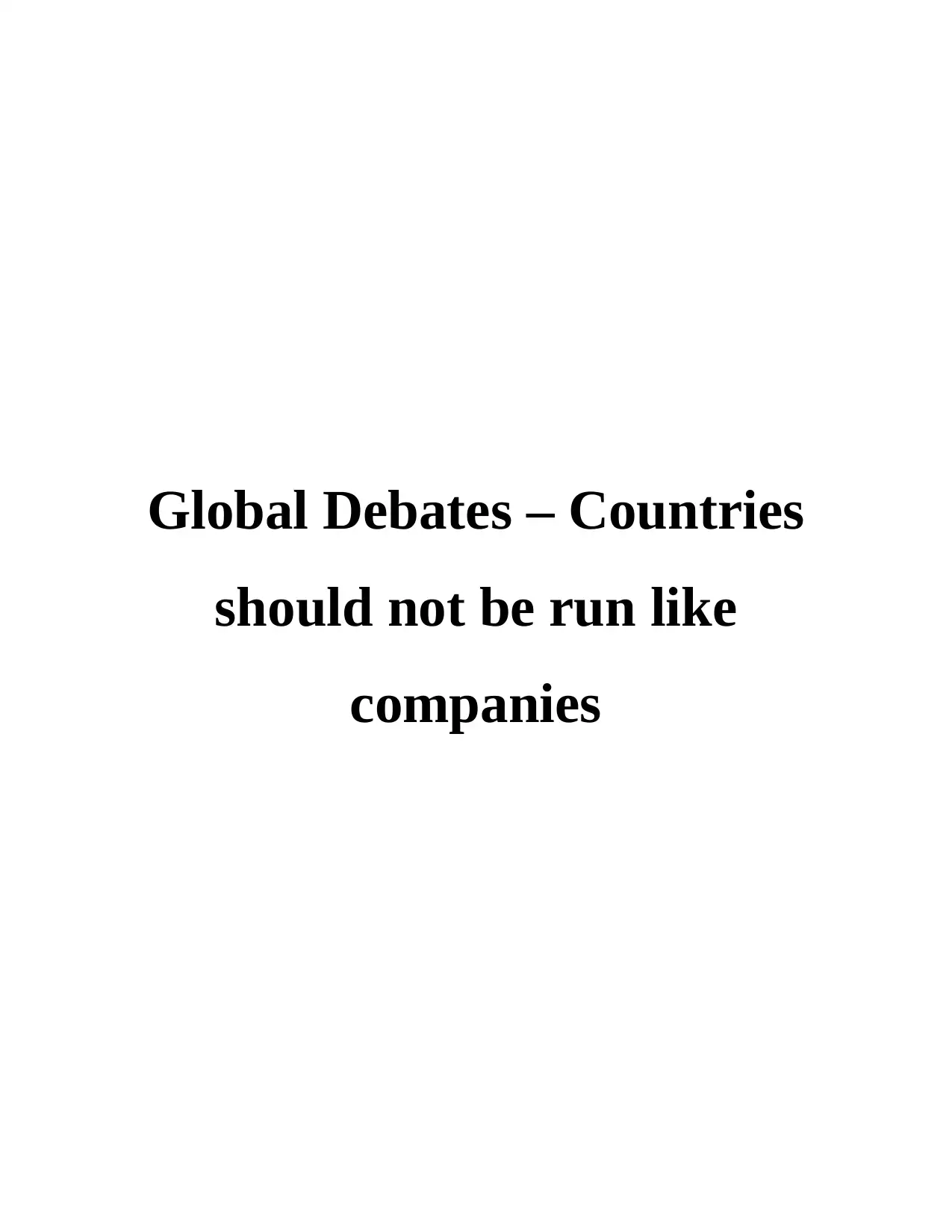
Global Debates – Countries
should not be run like
companies
should not be run like
companies
Paraphrase This Document
Need a fresh take? Get an instant paraphrase of this document with our AI Paraphraser
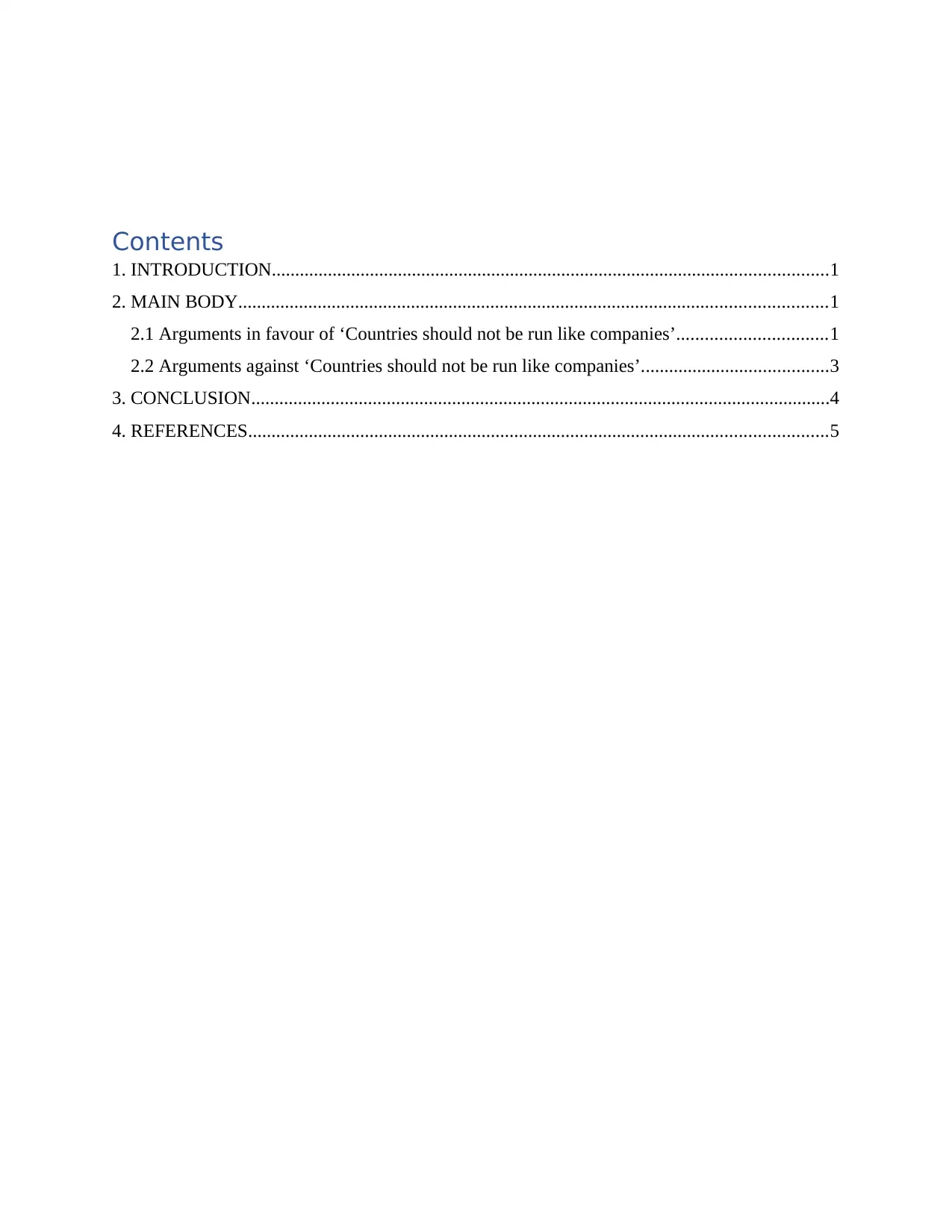
Contents
1. INTRODUCTION.......................................................................................................................1
2. MAIN BODY..............................................................................................................................1
2.1 Arguments in favour of ‘Countries should not be run like companies’................................1
2.2 Arguments against ‘Countries should not be run like companies’........................................3
3. CONCLUSION............................................................................................................................4
4. REFERENCES............................................................................................................................5
1. INTRODUCTION.......................................................................................................................1
2. MAIN BODY..............................................................................................................................1
2.1 Arguments in favour of ‘Countries should not be run like companies’................................1
2.2 Arguments against ‘Countries should not be run like companies’........................................3
3. CONCLUSION............................................................................................................................4
4. REFERENCES............................................................................................................................5
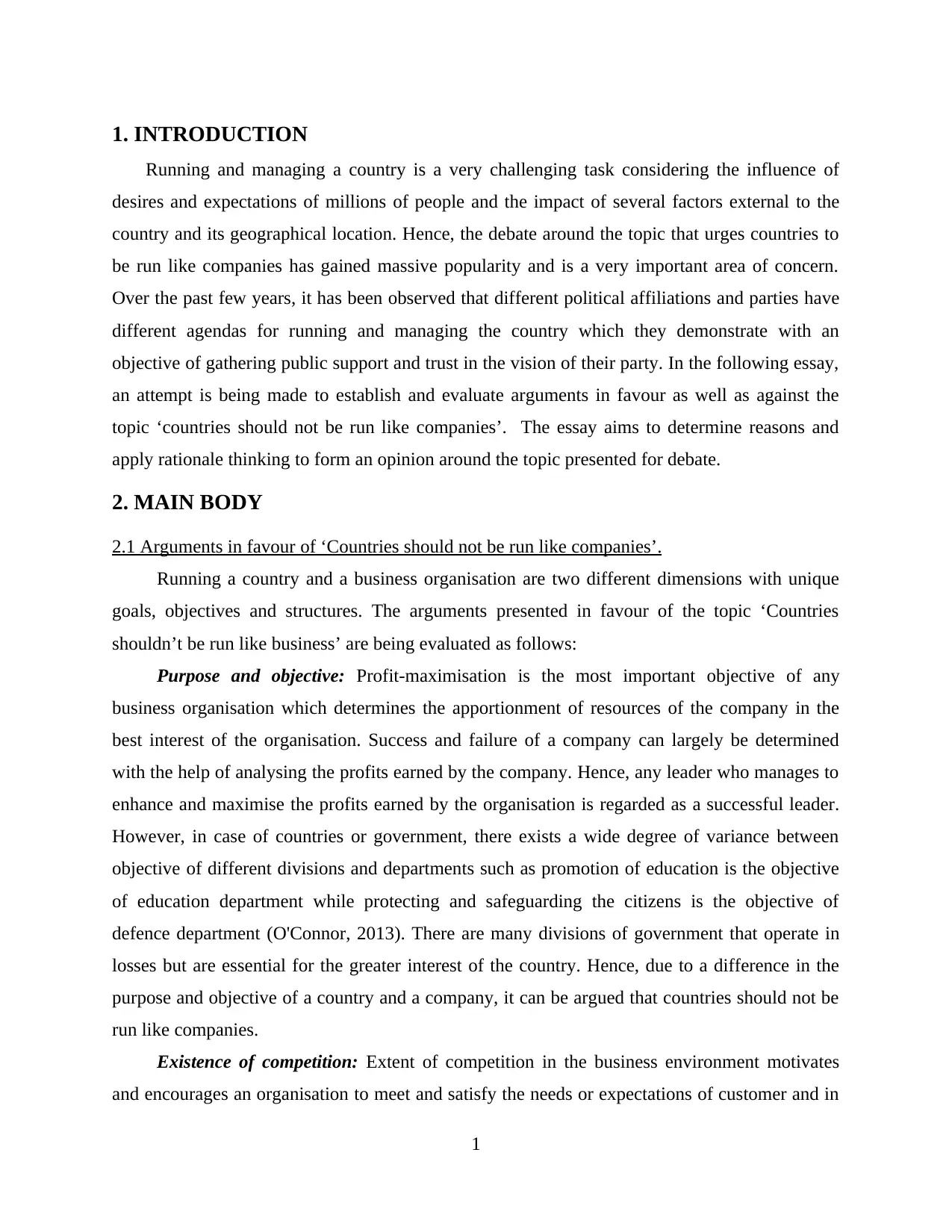
1. INTRODUCTION
Running and managing a country is a very challenging task considering the influence of
desires and expectations of millions of people and the impact of several factors external to the
country and its geographical location. Hence, the debate around the topic that urges countries to
be run like companies has gained massive popularity and is a very important area of concern.
Over the past few years, it has been observed that different political affiliations and parties have
different agendas for running and managing the country which they demonstrate with an
objective of gathering public support and trust in the vision of their party. In the following essay,
an attempt is being made to establish and evaluate arguments in favour as well as against the
topic ‘countries should not be run like companies’. The essay aims to determine reasons and
apply rationale thinking to form an opinion around the topic presented for debate.
2. MAIN BODY
2.1 Arguments in favour of ‘Countries should not be run like companies’.
Running a country and a business organisation are two different dimensions with unique
goals, objectives and structures. The arguments presented in favour of the topic ‘Countries
shouldn’t be run like business’ are being evaluated as follows:
Purpose and objective: Profit-maximisation is the most important objective of any
business organisation which determines the apportionment of resources of the company in the
best interest of the organisation. Success and failure of a company can largely be determined
with the help of analysing the profits earned by the company. Hence, any leader who manages to
enhance and maximise the profits earned by the organisation is regarded as a successful leader.
However, in case of countries or government, there exists a wide degree of variance between
objective of different divisions and departments such as promotion of education is the objective
of education department while protecting and safeguarding the citizens is the objective of
defence department (O'Connor, 2013). There are many divisions of government that operate in
losses but are essential for the greater interest of the country. Hence, due to a difference in the
purpose and objective of a country and a company, it can be argued that countries should not be
run like companies.
Existence of competition: Extent of competition in the business environment motivates
and encourages an organisation to meet and satisfy the needs or expectations of customer and in
1
Running and managing a country is a very challenging task considering the influence of
desires and expectations of millions of people and the impact of several factors external to the
country and its geographical location. Hence, the debate around the topic that urges countries to
be run like companies has gained massive popularity and is a very important area of concern.
Over the past few years, it has been observed that different political affiliations and parties have
different agendas for running and managing the country which they demonstrate with an
objective of gathering public support and trust in the vision of their party. In the following essay,
an attempt is being made to establish and evaluate arguments in favour as well as against the
topic ‘countries should not be run like companies’. The essay aims to determine reasons and
apply rationale thinking to form an opinion around the topic presented for debate.
2. MAIN BODY
2.1 Arguments in favour of ‘Countries should not be run like companies’.
Running a country and a business organisation are two different dimensions with unique
goals, objectives and structures. The arguments presented in favour of the topic ‘Countries
shouldn’t be run like business’ are being evaluated as follows:
Purpose and objective: Profit-maximisation is the most important objective of any
business organisation which determines the apportionment of resources of the company in the
best interest of the organisation. Success and failure of a company can largely be determined
with the help of analysing the profits earned by the company. Hence, any leader who manages to
enhance and maximise the profits earned by the organisation is regarded as a successful leader.
However, in case of countries or government, there exists a wide degree of variance between
objective of different divisions and departments such as promotion of education is the objective
of education department while protecting and safeguarding the citizens is the objective of
defence department (O'Connor, 2013). There are many divisions of government that operate in
losses but are essential for the greater interest of the country. Hence, due to a difference in the
purpose and objective of a country and a company, it can be argued that countries should not be
run like companies.
Existence of competition: Extent of competition in the business environment motivates
and encourages an organisation to meet and satisfy the needs or expectations of customer and in
1
⊘ This is a preview!⊘
Do you want full access?
Subscribe today to unlock all pages.

Trusted by 1+ million students worldwide
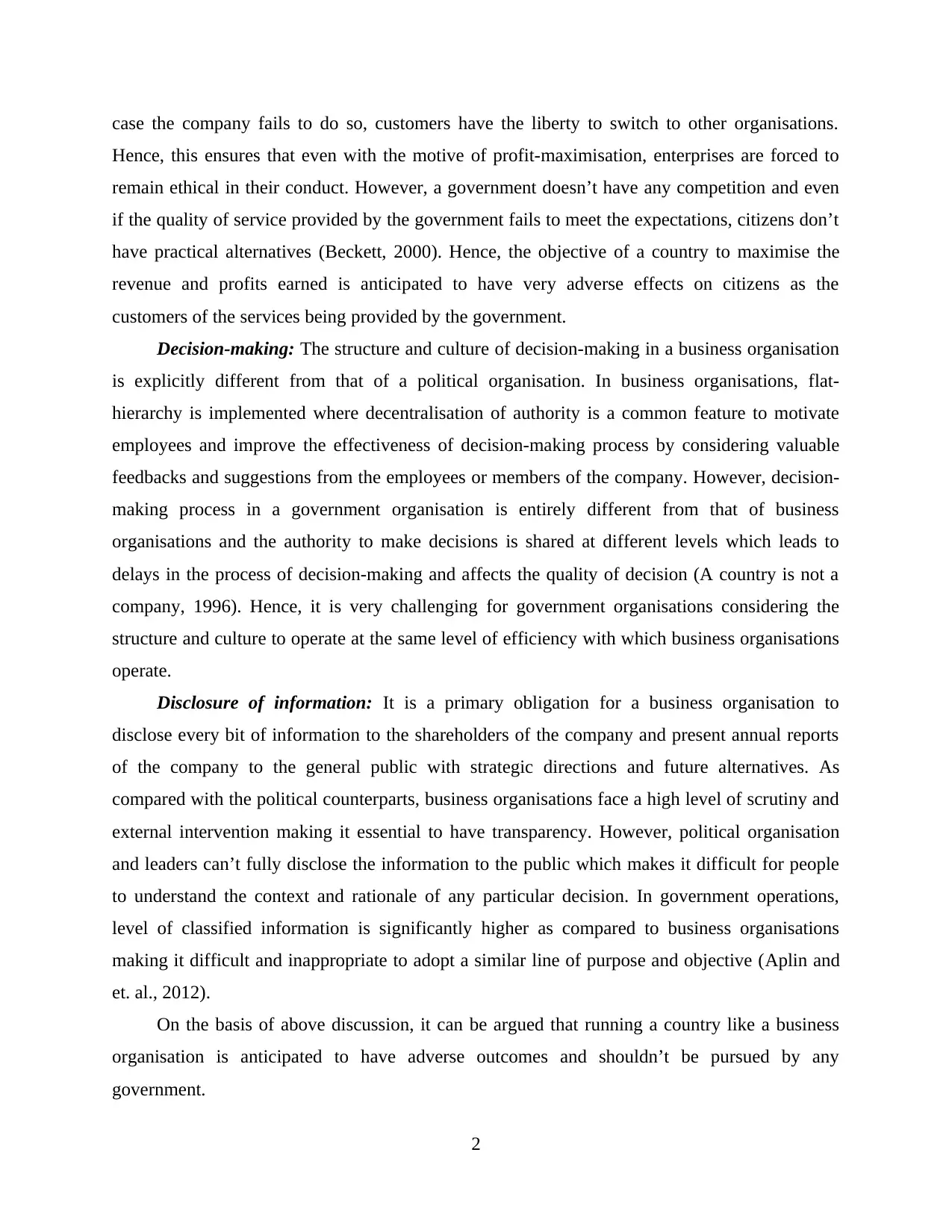
case the company fails to do so, customers have the liberty to switch to other organisations.
Hence, this ensures that even with the motive of profit-maximisation, enterprises are forced to
remain ethical in their conduct. However, a government doesn’t have any competition and even
if the quality of service provided by the government fails to meet the expectations, citizens don’t
have practical alternatives (Beckett, 2000). Hence, the objective of a country to maximise the
revenue and profits earned is anticipated to have very adverse effects on citizens as the
customers of the services being provided by the government.
Decision-making: The structure and culture of decision-making in a business organisation
is explicitly different from that of a political organisation. In business organisations, flat-
hierarchy is implemented where decentralisation of authority is a common feature to motivate
employees and improve the effectiveness of decision-making process by considering valuable
feedbacks and suggestions from the employees or members of the company. However, decision-
making process in a government organisation is entirely different from that of business
organisations and the authority to make decisions is shared at different levels which leads to
delays in the process of decision-making and affects the quality of decision (A country is not a
company, 1996). Hence, it is very challenging for government organisations considering the
structure and culture to operate at the same level of efficiency with which business organisations
operate.
Disclosure of information: It is a primary obligation for a business organisation to
disclose every bit of information to the shareholders of the company and present annual reports
of the company to the general public with strategic directions and future alternatives. As
compared with the political counterparts, business organisations face a high level of scrutiny and
external intervention making it essential to have transparency. However, political organisation
and leaders can’t fully disclose the information to the public which makes it difficult for people
to understand the context and rationale of any particular decision. In government operations,
level of classified information is significantly higher as compared to business organisations
making it difficult and inappropriate to adopt a similar line of purpose and objective (Aplin and
et. al., 2012).
On the basis of above discussion, it can be argued that running a country like a business
organisation is anticipated to have adverse outcomes and shouldn’t be pursued by any
government.
2
Hence, this ensures that even with the motive of profit-maximisation, enterprises are forced to
remain ethical in their conduct. However, a government doesn’t have any competition and even
if the quality of service provided by the government fails to meet the expectations, citizens don’t
have practical alternatives (Beckett, 2000). Hence, the objective of a country to maximise the
revenue and profits earned is anticipated to have very adverse effects on citizens as the
customers of the services being provided by the government.
Decision-making: The structure and culture of decision-making in a business organisation
is explicitly different from that of a political organisation. In business organisations, flat-
hierarchy is implemented where decentralisation of authority is a common feature to motivate
employees and improve the effectiveness of decision-making process by considering valuable
feedbacks and suggestions from the employees or members of the company. However, decision-
making process in a government organisation is entirely different from that of business
organisations and the authority to make decisions is shared at different levels which leads to
delays in the process of decision-making and affects the quality of decision (A country is not a
company, 1996). Hence, it is very challenging for government organisations considering the
structure and culture to operate at the same level of efficiency with which business organisations
operate.
Disclosure of information: It is a primary obligation for a business organisation to
disclose every bit of information to the shareholders of the company and present annual reports
of the company to the general public with strategic directions and future alternatives. As
compared with the political counterparts, business organisations face a high level of scrutiny and
external intervention making it essential to have transparency. However, political organisation
and leaders can’t fully disclose the information to the public which makes it difficult for people
to understand the context and rationale of any particular decision. In government operations,
level of classified information is significantly higher as compared to business organisations
making it difficult and inappropriate to adopt a similar line of purpose and objective (Aplin and
et. al., 2012).
On the basis of above discussion, it can be argued that running a country like a business
organisation is anticipated to have adverse outcomes and shouldn’t be pursued by any
government.
2
Paraphrase This Document
Need a fresh take? Get an instant paraphrase of this document with our AI Paraphraser
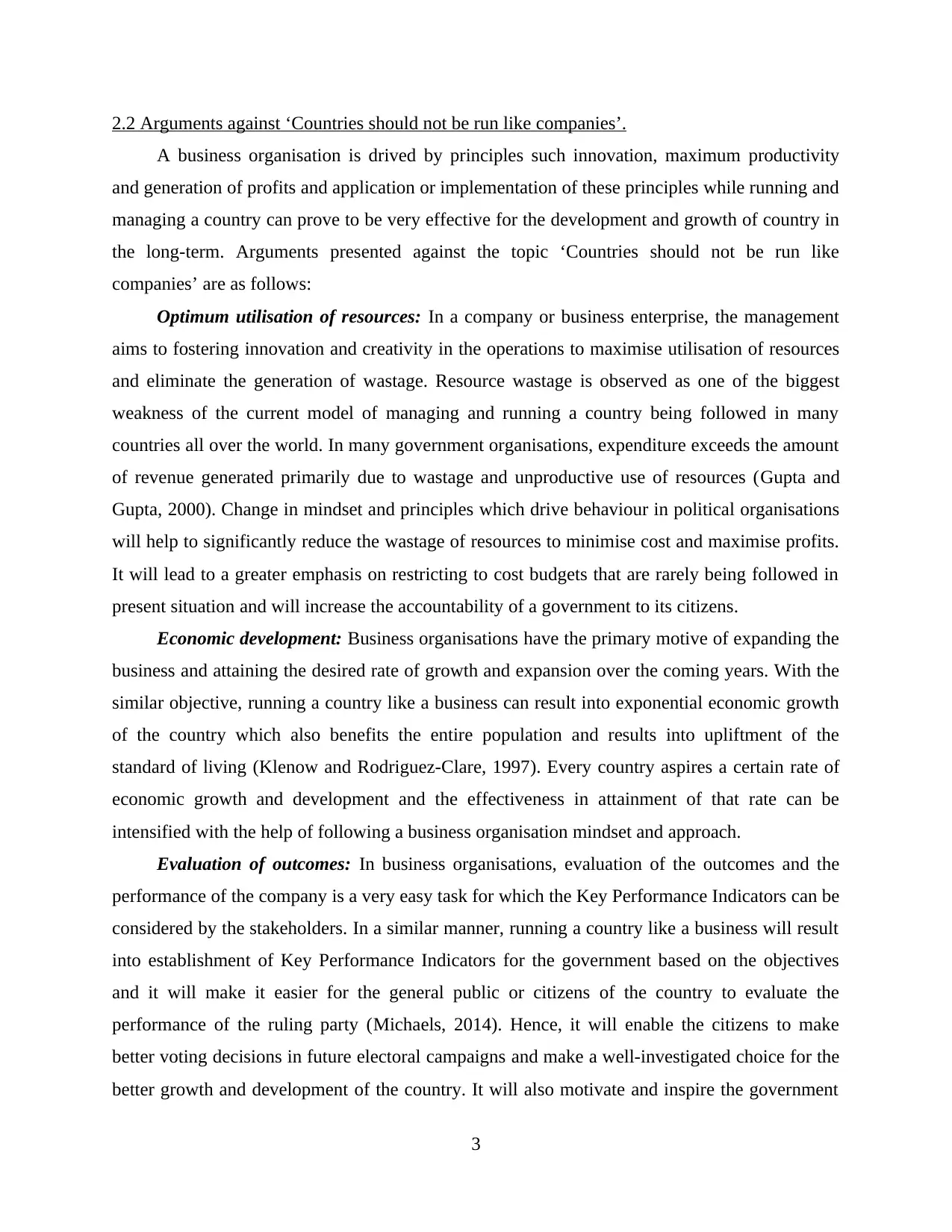
2.2 Arguments against ‘Countries should not be run like companies’.
A business organisation is drived by principles such innovation, maximum productivity
and generation of profits and application or implementation of these principles while running and
managing a country can prove to be very effective for the development and growth of country in
the long-term. Arguments presented against the topic ‘Countries should not be run like
companies’ are as follows:
Optimum utilisation of resources: In a company or business enterprise, the management
aims to fostering innovation and creativity in the operations to maximise utilisation of resources
and eliminate the generation of wastage. Resource wastage is observed as one of the biggest
weakness of the current model of managing and running a country being followed in many
countries all over the world. In many government organisations, expenditure exceeds the amount
of revenue generated primarily due to wastage and unproductive use of resources (Gupta and
Gupta, 2000). Change in mindset and principles which drive behaviour in political organisations
will help to significantly reduce the wastage of resources to minimise cost and maximise profits.
It will lead to a greater emphasis on restricting to cost budgets that are rarely being followed in
present situation and will increase the accountability of a government to its citizens.
Economic development: Business organisations have the primary motive of expanding the
business and attaining the desired rate of growth and expansion over the coming years. With the
similar objective, running a country like a business can result into exponential economic growth
of the country which also benefits the entire population and results into upliftment of the
standard of living (Klenow and Rodriguez-Clare, 1997). Every country aspires a certain rate of
economic growth and development and the effectiveness in attainment of that rate can be
intensified with the help of following a business organisation mindset and approach.
Evaluation of outcomes: In business organisations, evaluation of the outcomes and the
performance of the company is a very easy task for which the Key Performance Indicators can be
considered by the stakeholders. In a similar manner, running a country like a business will result
into establishment of Key Performance Indicators for the government based on the objectives
and it will make it easier for the general public or citizens of the country to evaluate the
performance of the ruling party (Michaels, 2014). Hence, it will enable the citizens to make
better voting decisions in future electoral campaigns and make a well-investigated choice for the
better growth and development of the country. It will also motivate and inspire the government
3
A business organisation is drived by principles such innovation, maximum productivity
and generation of profits and application or implementation of these principles while running and
managing a country can prove to be very effective for the development and growth of country in
the long-term. Arguments presented against the topic ‘Countries should not be run like
companies’ are as follows:
Optimum utilisation of resources: In a company or business enterprise, the management
aims to fostering innovation and creativity in the operations to maximise utilisation of resources
and eliminate the generation of wastage. Resource wastage is observed as one of the biggest
weakness of the current model of managing and running a country being followed in many
countries all over the world. In many government organisations, expenditure exceeds the amount
of revenue generated primarily due to wastage and unproductive use of resources (Gupta and
Gupta, 2000). Change in mindset and principles which drive behaviour in political organisations
will help to significantly reduce the wastage of resources to minimise cost and maximise profits.
It will lead to a greater emphasis on restricting to cost budgets that are rarely being followed in
present situation and will increase the accountability of a government to its citizens.
Economic development: Business organisations have the primary motive of expanding the
business and attaining the desired rate of growth and expansion over the coming years. With the
similar objective, running a country like a business can result into exponential economic growth
of the country which also benefits the entire population and results into upliftment of the
standard of living (Klenow and Rodriguez-Clare, 1997). Every country aspires a certain rate of
economic growth and development and the effectiveness in attainment of that rate can be
intensified with the help of following a business organisation mindset and approach.
Evaluation of outcomes: In business organisations, evaluation of the outcomes and the
performance of the company is a very easy task for which the Key Performance Indicators can be
considered by the stakeholders. In a similar manner, running a country like a business will result
into establishment of Key Performance Indicators for the government based on the objectives
and it will make it easier for the general public or citizens of the country to evaluate the
performance of the ruling party (Michaels, 2014). Hence, it will enable the citizens to make
better voting decisions in future electoral campaigns and make a well-investigated choice for the
better growth and development of the country. It will also motivate and inspire the government
3
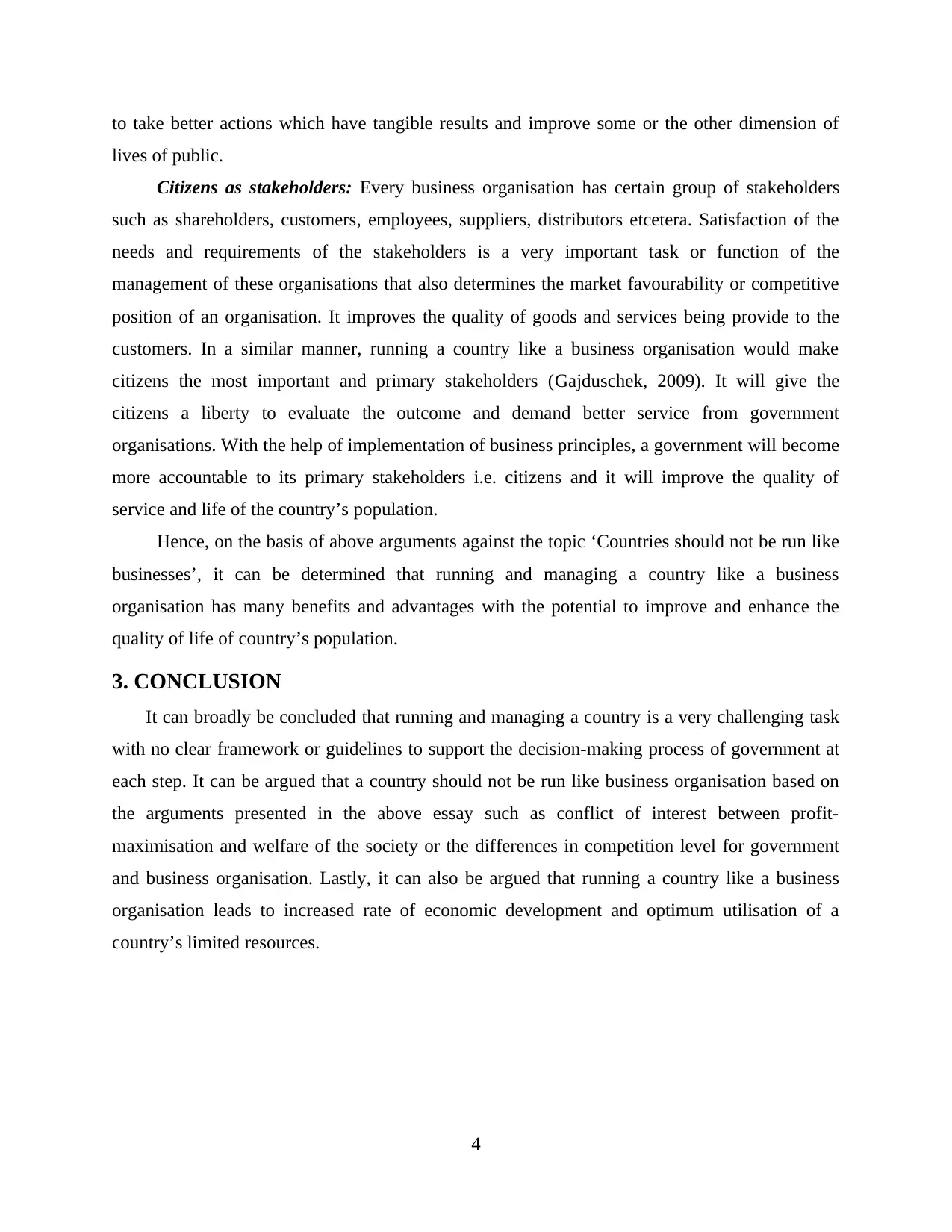
to take better actions which have tangible results and improve some or the other dimension of
lives of public.
Citizens as stakeholders: Every business organisation has certain group of stakeholders
such as shareholders, customers, employees, suppliers, distributors etcetera. Satisfaction of the
needs and requirements of the stakeholders is a very important task or function of the
management of these organisations that also determines the market favourability or competitive
position of an organisation. It improves the quality of goods and services being provide to the
customers. In a similar manner, running a country like a business organisation would make
citizens the most important and primary stakeholders (Gajduschek, 2009). It will give the
citizens a liberty to evaluate the outcome and demand better service from government
organisations. With the help of implementation of business principles, a government will become
more accountable to its primary stakeholders i.e. citizens and it will improve the quality of
service and life of the country’s population.
Hence, on the basis of above arguments against the topic ‘Countries should not be run like
businesses’, it can be determined that running and managing a country like a business
organisation has many benefits and advantages with the potential to improve and enhance the
quality of life of country’s population.
3. CONCLUSION
It can broadly be concluded that running and managing a country is a very challenging task
with no clear framework or guidelines to support the decision-making process of government at
each step. It can be argued that a country should not be run like business organisation based on
the arguments presented in the above essay such as conflict of interest between profit-
maximisation and welfare of the society or the differences in competition level for government
and business organisation. Lastly, it can also be argued that running a country like a business
organisation leads to increased rate of economic development and optimum utilisation of a
country’s limited resources.
4
lives of public.
Citizens as stakeholders: Every business organisation has certain group of stakeholders
such as shareholders, customers, employees, suppliers, distributors etcetera. Satisfaction of the
needs and requirements of the stakeholders is a very important task or function of the
management of these organisations that also determines the market favourability or competitive
position of an organisation. It improves the quality of goods and services being provide to the
customers. In a similar manner, running a country like a business organisation would make
citizens the most important and primary stakeholders (Gajduschek, 2009). It will give the
citizens a liberty to evaluate the outcome and demand better service from government
organisations. With the help of implementation of business principles, a government will become
more accountable to its primary stakeholders i.e. citizens and it will improve the quality of
service and life of the country’s population.
Hence, on the basis of above arguments against the topic ‘Countries should not be run like
businesses’, it can be determined that running and managing a country like a business
organisation has many benefits and advantages with the potential to improve and enhance the
quality of life of country’s population.
3. CONCLUSION
It can broadly be concluded that running and managing a country is a very challenging task
with no clear framework or guidelines to support the decision-making process of government at
each step. It can be argued that a country should not be run like business organisation based on
the arguments presented in the above essay such as conflict of interest between profit-
maximisation and welfare of the society or the differences in competition level for government
and business organisation. Lastly, it can also be argued that running a country like a business
organisation leads to increased rate of economic development and optimum utilisation of a
country’s limited resources.
4
⊘ This is a preview!⊘
Do you want full access?
Subscribe today to unlock all pages.

Trusted by 1+ million students worldwide
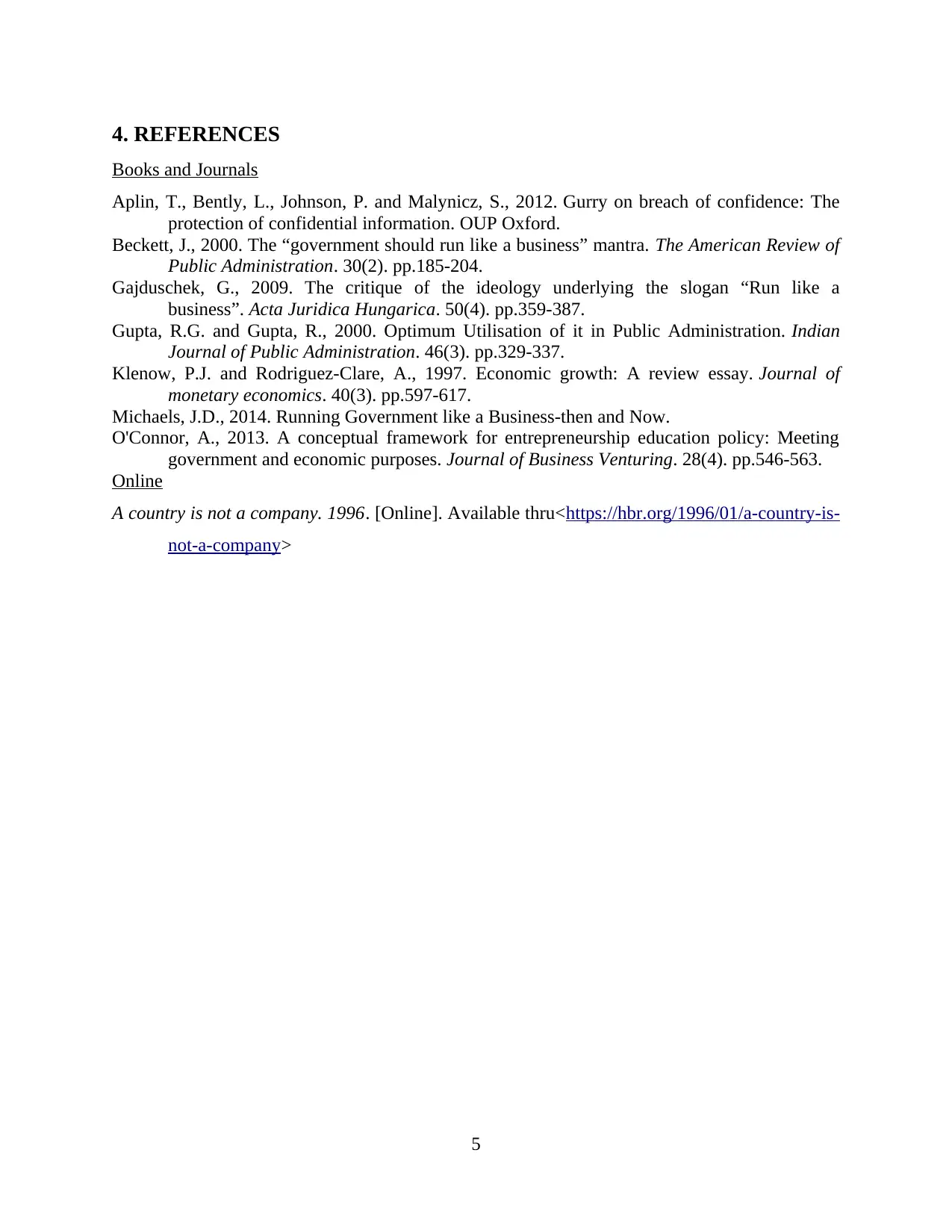
4. REFERENCES
Books and Journals
Aplin, T., Bently, L., Johnson, P. and Malynicz, S., 2012. Gurry on breach of confidence: The
protection of confidential information. OUP Oxford.
Beckett, J., 2000. The “government should run like a business” mantra. The American Review of
Public Administration. 30(2). pp.185-204.
Gajduschek, G., 2009. The critique of the ideology underlying the slogan “Run like a
business”. Acta Juridica Hungarica. 50(4). pp.359-387.
Gupta, R.G. and Gupta, R., 2000. Optimum Utilisation of it in Public Administration. Indian
Journal of Public Administration. 46(3). pp.329-337.
Klenow, P.J. and Rodriguez-Clare, A., 1997. Economic growth: A review essay. Journal of
monetary economics. 40(3). pp.597-617.
Michaels, J.D., 2014. Running Government like a Business-then and Now.
O'Connor, A., 2013. A conceptual framework for entrepreneurship education policy: Meeting
government and economic purposes. Journal of Business Venturing. 28(4). pp.546-563.
Online
A country is not a company. 1996. [Online]. Available thru<https://hbr.org/1996/01/a-country-is-
not-a-company>
5
Books and Journals
Aplin, T., Bently, L., Johnson, P. and Malynicz, S., 2012. Gurry on breach of confidence: The
protection of confidential information. OUP Oxford.
Beckett, J., 2000. The “government should run like a business” mantra. The American Review of
Public Administration. 30(2). pp.185-204.
Gajduschek, G., 2009. The critique of the ideology underlying the slogan “Run like a
business”. Acta Juridica Hungarica. 50(4). pp.359-387.
Gupta, R.G. and Gupta, R., 2000. Optimum Utilisation of it in Public Administration. Indian
Journal of Public Administration. 46(3). pp.329-337.
Klenow, P.J. and Rodriguez-Clare, A., 1997. Economic growth: A review essay. Journal of
monetary economics. 40(3). pp.597-617.
Michaels, J.D., 2014. Running Government like a Business-then and Now.
O'Connor, A., 2013. A conceptual framework for entrepreneurship education policy: Meeting
government and economic purposes. Journal of Business Venturing. 28(4). pp.546-563.
Online
A country is not a company. 1996. [Online]. Available thru<https://hbr.org/1996/01/a-country-is-
not-a-company>
5
1 out of 7
Related Documents
Your All-in-One AI-Powered Toolkit for Academic Success.
+13062052269
info@desklib.com
Available 24*7 on WhatsApp / Email
![[object Object]](/_next/static/media/star-bottom.7253800d.svg)
Unlock your academic potential
Copyright © 2020–2025 A2Z Services. All Rights Reserved. Developed and managed by ZUCOL.





